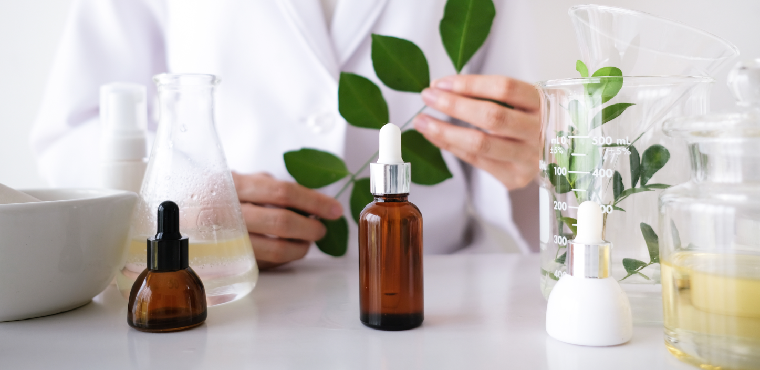
Apr 22, 2019
How Hyaluronic Acid Benefits Skin
Benefits of Hyaluronic Acid
If you’re in the business of skin care formulation, keeping up with trends in the skincare industry is vital. Do your research to find the most effective ingredients to add to your products and educate your target market on these benefits. A great ingredient to start with is hyaluronic acid, a humectant that occurs naturally in the body.
What is Hyaluronic Acid?
Hyaluronic acid, also known as hyaluronan, is a humectant, or moisture-binding ingredient. Its main benefit is hydration, with 1g of hyaluronic acid capable of binding to 6 liters of moisture.
Hyaluronic acid occurs naturally in the body. The average 155 lb. person has approximately 15 grams of hyaluronan in their body. Roughly 50% of that is present in your skin in the spaces between cells, binding to water to help retain moisture in your skin. Babies are born with a high level of hyaluronic acid, but as we age our bodies produce less and less of this natural anti-aging wonder ingredient. This is the reason for babies’ skin is so plump, firm and supple. From this, it is clear why it is an excellent ingredient to add to your skin care formulation.
So, what’s the catch, you ask? There isn’t one! There are no negative side effects to the use of hyaluronan in skin care formulas, an important fact when considering including it in your new skin care formulation. Since your body produces less hyaluronic acid especially after the age of 40, supplementing it in your skin care formulas is extremely beneficial to firm up and hydrate skin.
Benefits of Hyaluronic Acid
The benefits of hyaluronic acid are plentiful. Not only does it alleviate dry skin, but it also reduces the appearance of fine lines and wrinkles, helps with wound repair and reduces inflammation.
Alleviates Dry Skin
Hyaluronic acid can carry 1000 times its weight in water, which is why it is so effective in binding water molecules to the skin cells. The humectant draws moisture from its surroundings and then boosts hydration in the outer layers of the skin to leave it smoother, softer and fully hydrated.
There is no adverse reaction when using it in conjunction with skin care products that treat oily or acne-prone skin. It is suited to any skin type and won’t interact with any skin care products you might use to target skin conditions. It also doesn’t overdo it by adding too much moisture to the skin that causes key ingredients to break down. It maintains a gentle balance to give your skin the moisture it needs.
Reduces Fine Lines and Wrinkles
The hyaluronic molecule is quite large, so as is it cannot be easily absorbed into the deeper layers of the skin. Instead, it rests on the surface of the skin and holds on to moisture that then penetrates your skin. For this reason, medical professionals have experimented with hyaluronic acid as a dermal filler to fill in wrinkles and smooth the lines on your skin. Dermatologists inject the molecule directly into patients’ skin for it to work even better in plumping up the skin and removing contours.
Recently, however, there has been research into reducing the size of the hyaluronic acid molecules so that its benefits can be delivered deeper into the skin without an injection. Low molecular weight hyaluronic acid consists of smaller molecules that can reach deeper into the skin’s uppermost layers. Skin care products that use low molecular weight hyaluronic acid are becoming more commonly available. With deeper penetration hyaluronic acid has shown to reduce fine lines and wrinkles by up to 40%.
Another excellent ingredient is the salt derived from hyaluronic acid, called sodium hyaluronate. It is sometimes used interchangeably in the beauty industry but is quite different. Sodium hyaluronate molecules are considerably smaller than those of hyaluronic acid. Therefore, it is more easily absorbed by the skin and performs a similar function.
Wound Repair and Inflammation
Hyaluronic acid provides the skin with antioxidants which reduces inflammation and allows the skin to repair itself. It has a naturally calming effect on the skin and is especially good for breakout-prone skin. When applied directly to open wounds it signals to the body to increase blood vessels in the area of the damaged skin and so speeds up the healing process. According to an article published in PubMed, it also reduces the size of wounds and helps with the pain.
It’s not just a buzz word. Hyaluronic acid provides several benefits and no known risks. Take advantage of this natural ingredient to boost your credibility and your sales. Whether you have an anti-aging skin care product or want to direct your focus to problem skin, hyaluronic acid can be an extremely beneficial ingredient.